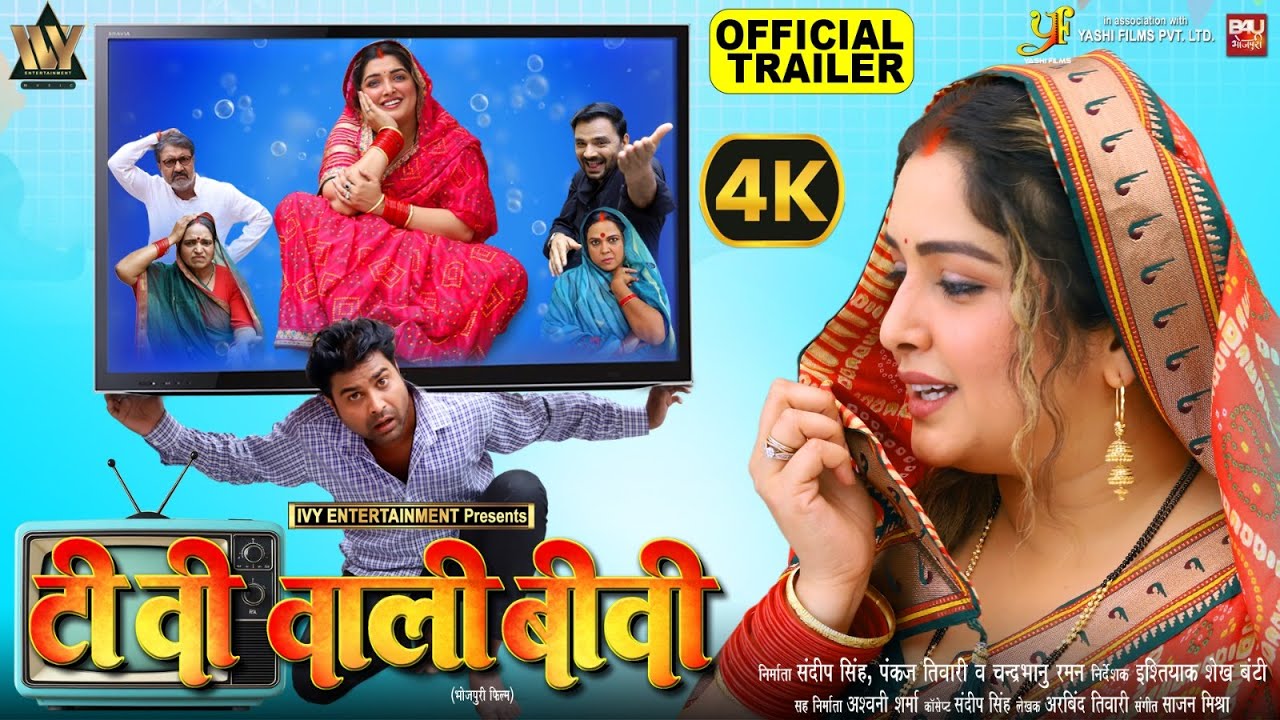The world of entertainment isn’t just about laughter, drama, or romance—it can also inspire practical life lessons. The recently released official trailer of the Bhojpuri movie “TV WALI BIWI”, starring Amrapali Dubey, is currently making waves among audiences. Beyond its cinematic appeal, the film provides an opportunity to discuss important life topics: insurance, loans, health, and wealth management. Let’s explore how entertainment and real-life financial planning intersect.
TV WALI BIWI: A Brief Overview
“TV WALI BIWI” showcases the story of a modern household and its humorous, dramatic twists. Amrapali Dubey, known for her engaging performances, plays the lead role, bringing energy and charm to the screen. The film’s narrative revolves around family dynamics, social responsibilities, and everyday challenges—situations that viewers can relate to.
While the movie is designed to entertain, it subtly reminds us of real-world lessons: planning for unexpected events, balancing resources, and investing in long-term security. This is where concepts like insurance, loans, health, and wealth management come into play.
Insurance: Protecting What Matters
Just as characters in the movie face unexpected challenges, real-life emergencies can occur without warning. Insurance acts as a safety net, providing financial protection during unforeseen events.
-
Life Insurance: Ensures that your family is financially secure even in your absence. Similar to the way characters depend on each other in the film, real families depend on insurance coverage to sustain their lifestyle.
-
Health Insurance: Covers medical expenses from routine check-ups to emergencies. With rising healthcare costs, a comprehensive health plan ensures that illness doesn’t derail your finances.
-
Property Insurance: Safeguards valuable assets such as homes, vehicles, and electronics—items that often appear in household-based storylines like “TV WALI BIWI.”
By securing appropriate insurance policies, individuals can focus on building their careers, supporting families, and enjoying life—much like the characters in cinematic narratives who navigate challenges confidently.
Loans: Tools for Growth
In the movie, characters often find creative ways to manage household responsibilities and finances. Similarly, loans can provide critical financial support when used responsibly.
-
Personal Loans: Can cover sudden expenses, such as medical bills or home repairs, without draining savings.
-
Home Loans: Enable families to invest in housing while spreading the cost over time.
-
Business Loans: Provide capital for entrepreneurs to launch or expand ventures.
While borrowing is sometimes necessary, it’s crucial to evaluate interest rates, repayment terms, and personal capacity to repay. Just as characters in films learn lessons from mismanagement, real-life financial missteps can be avoided through careful planning.
Health: The Foundation of Wealth
The well-being of movie characters often reflects the importance of physical and mental health. In real life, health directly impacts wealth and productivity:
-
Preventive Care: Regular check-ups and a healthy lifestyle reduce the risk of expensive treatments later.
-
Health Savings Accounts (HSA): Saving pre-tax money for medical expenses ensures financial preparedness for emergencies.
-
Workplace Wellness: Programs supporting mental health, fitness, and nutrition improve overall productivity, helping individuals pursue wealth-building opportunities.
Maintaining good health is like having a well-written script: it ensures the story of your life progresses smoothly without unnecessary interruptions.
Wealth Management: Building a Secure Future
Just as a well-crafted movie balances plot, character development, and resolution, a strong financial plan balances saving, investing, and risk management:
-
Investing: Stocks, mutual funds, bonds, and real estate help grow wealth over time. Diversification reduces risk and maximizes returns.
-
Retirement Planning: Pension plans and retirement accounts ensure a comfortable post-work life.
-
Emergency Fund: Keeping 6–12 months of living expenses accessible protects against unexpected financial shocks.
-
Financial Advice: Certified advisors help tailor strategies to individual goals and risk tolerance.
By integrating wealth management with insurance, loans, and health planning, individuals can enjoy financial stability—mirroring the harmony and resolution often portrayed in films like “TV WALI BIWI.”
Lessons from TV WALI BIWI
Watching movies like “TV WALI BIWI” reminds us that life is full of surprises. Here are practical takeaways:
-
Plan Ahead: Just as characters navigate challenges, plan your finances through insurance and savings.
-
Invest in Health: Good health ensures you can work effectively and enjoy life.
-
Use Loans Wisely: Borrow strategically for meaningful purposes, not impulsive expenses.
-
Diversify Income and Investments: Multiple revenue streams and investments reduce risk.
-
Stay Informed: Knowledge about financial tools empowers you to make better decisions.
Entertainment can teach valuable life lessons while keeping us engaged. Films like this highlight family, relationships, and responsibility—reminding viewers that financial stability is essential for a happy, stress-free life.
Conclusion
“TV WALI BIWI” is more than just a movie—it’s an entry point to discuss financial literacy in an engaging way. By linking lessons from cinema to insurance, loans, health, and wealth, we can create a roadmap for secure living.
Plan your finances, prioritize health, use loans responsibly, and invest in wealth wisely. By doing so, you not only enjoy your favorite films stress-free but also prepare for a secure, prosperous future. Just as Amrapali Dubey’s character navigates her world with courage and strategy, you too can face life’s uncertainties with confidence and financial resilience.

